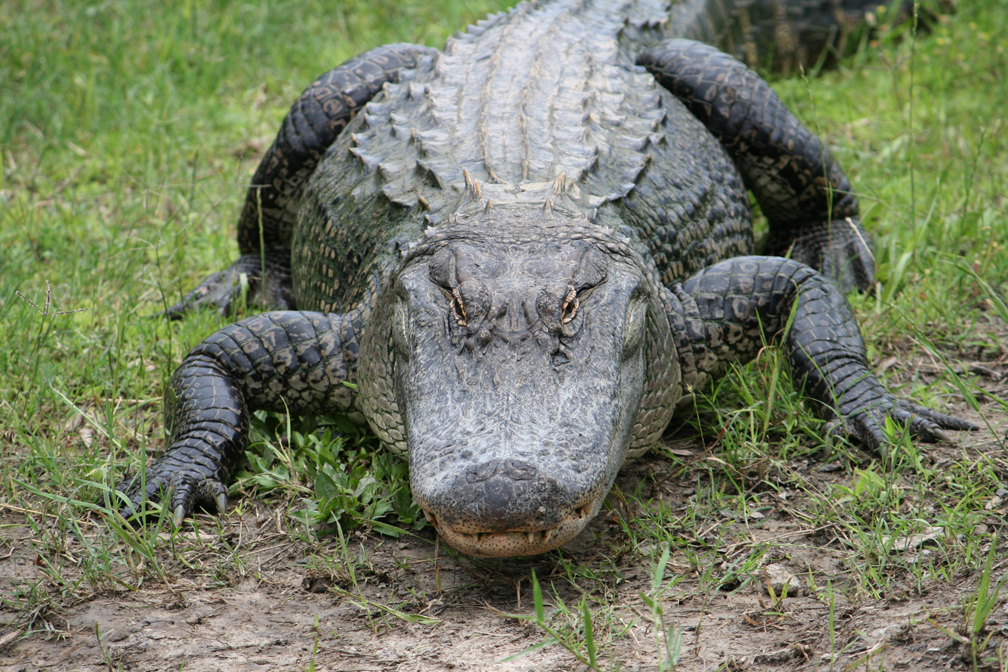
How to Get Rid of Alligators? Your Complete Guide
Alligators can be an issue if they appear on your property. It’s important to take action and remove them to protect yourself and your pets from harm. You will receive helpful advice on how to get rid of gators and prevent attacks from them, as well as safety precautions to follow.
Alligators have been a part of the United States for millions of years. As part of the ecosystem, they play a significant role. These predators typically live in freshwater habitats such as swamps, lakes, and rivers and can grow up to 14 feet long.
Attacks by predators can happen when people invade their territory or when they feel threatened.
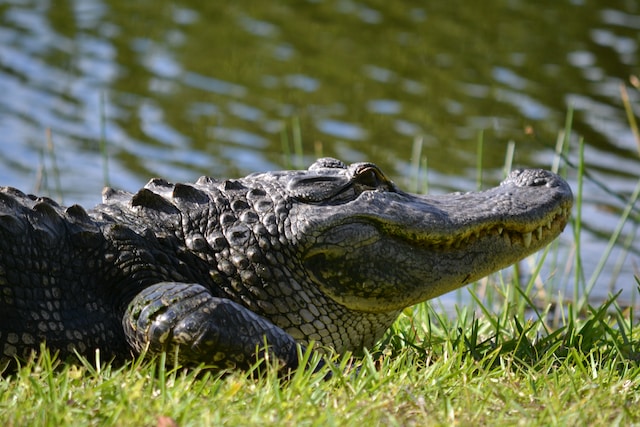
Eliminate Things that Attract Alligators
Preventing any alligator from coming onto your property is an excellent first step.
You can do this by removing potential food sources like trash and pet food, securing your garden and swimming pool area with fences or walls, and making your land less attractive to alligators by clearing brush and rubble.
Before building any wall, fence, or any other physical barrier, verify with your city if you need a building permit before starting your project.
How to get rid of alligators?
If gators are already on your property, various removal techniques can be used to get rid of them and keep them at bay. Professional alligator removal services can be expensive but effective.
Trapping is also an effective and humane way to remove alligators. Alligator repellents such as noise and light can also deter them. However, after you trap alligators, relocating them requires specialized training and can be effective.
Removing gators, even young ones, is unsafe and should be left to a professional wildlife specialist.
Nuisance alligator
It is important to remember that alligator removal is regulated by state and federal laws. Hiring licensed professionals can ensure that all wildlife handling is done legally. Illegal alligator can result in fines and legal consequences.
Taking action now is essential to prevent alligators from appearing on your estate. Using various eviction techniques can help keep you and your loved ones secure in most cases.
Make sure to follow all legal regulations and hire licensed professionals when necessary.
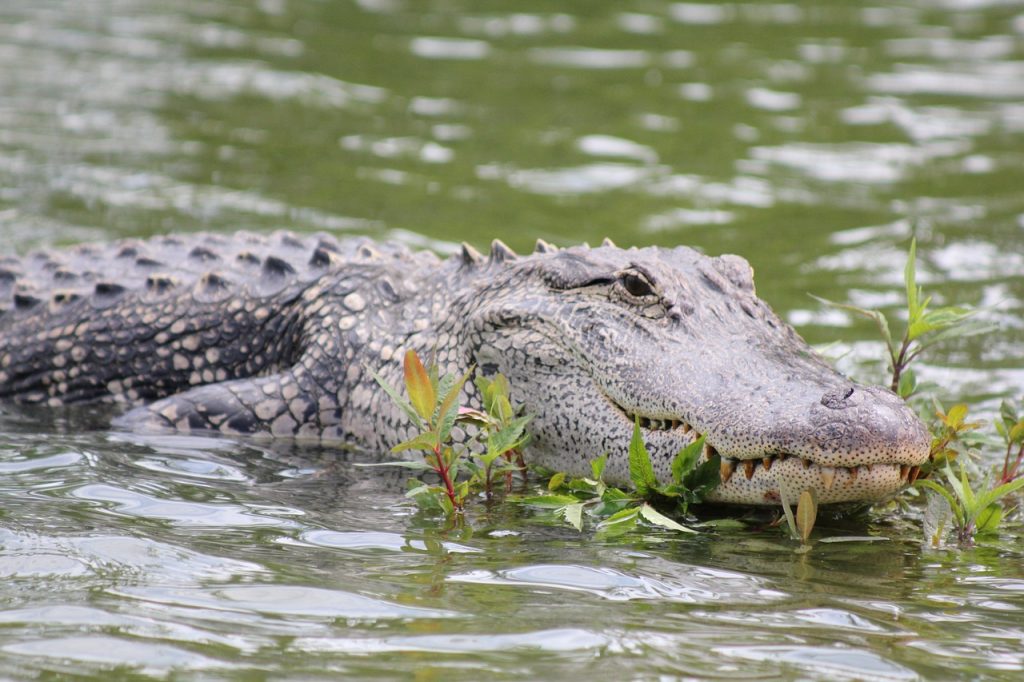
FAQS
Are Alligators Harmful To Humans? Do alligators attack humans?
Alligators can pose a risk to humans if they perceive a threat or provocation.
While uncommon, attacks on people can be dangerous and sometimes fatal.
As carnivorous predators, alligators possess strong jaws, teeth, and tails capable of causing severe harm.
It’s critical to exercise caution when near or in alligator habitats and to comply with any safety protocols or advisories provided by park officials. If you see an alligator, it’s best to maintain a generous distance and avoid any actions that may aggravate or provoke it.
If you observe an alligator that presents a risk to individuals or house pets, it’s advisable to contact your local wildlife authorities or a qualified alligator specialist company for assistance.
When do these alligators attack humans?
Attacks on people usually occur when the animals feel provoked, threatened, or trapped.
During mating season, male alligators can become more territorial and aggressive, sometimes leading to attacks on people. Additionally, female alligators may attack when they feel their nests or offspring are threatened.
Certain human activities, such as feeding or harassing an adult alligator, have also been linked to attacks. These behaviors can cause alligators to become more dangerous by losing their natural fear of human beings.
It’s important to show caution and respect when in or around alligator habitats and to avoid any actions that could upset or incite them.
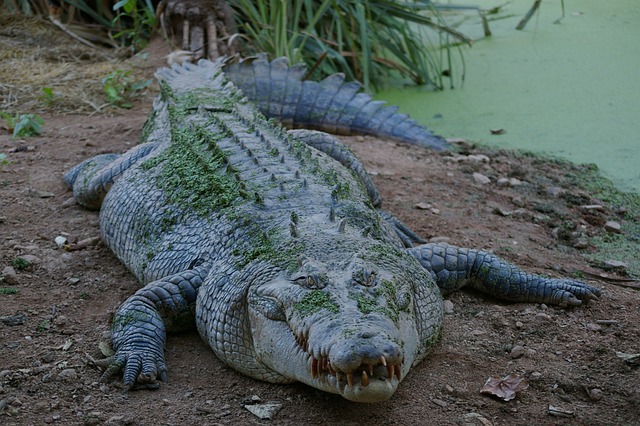
How fast can an alligator run on dry land?
While alligators are not renowned for their speed on land, they can still move quickly when necessary.
On dry ground, alligators can run at speeds of up to 11 miles per hour (17.7 kilometers per hour) for short distances, typically when chasing prey or trying to evade danger.
However, gators are considerably faster in the water, where they can swim at speeds of up to 20 miles per hour (32.2 kilometers per hour) for brief periods.
It’s important to remember that alligators are strong and agile beings that can move quickly on land and in the water.
If they attack, there is always the potential for severe injuries or even death, so it is crucial to use extreme caution when they are around, or you suspect them to frequent an area.
Alligator Attacks
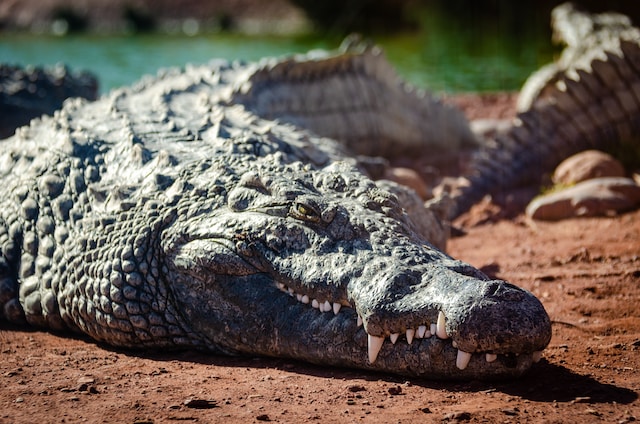
Tips to save yourself from being bitten by alligators
To avoid being targeted by alligators, there are several tips you should follow:
- Stay away from alligator habitats: Avoid areas where alligators are known to reside, especially during their active hours at dawn and sunset.
- Be alert: If you are in an area where alligators are present, stay vigilant and aware of your surroundings. This is crucial especially when it comes to water edges and areas with known hunting grounds.
- Keep your distance: Always maintain a good distance from alligators and never approach or attempt to feed them.
- Avoid swimming in areas with alligators: If you are in freshwater areas where alligators live, only swim in designated areas monitored for alligator activity. Do not swim in any water body where they are resting. Being in a freshwater area at dusk or dawn is also unsafe when the alligators are most active.
- Keep pets on a leash: When walking your pet near a water source, keep them close at all times to prevent them from running near the edges and attract alligators.
- Be cautious around the water: Alligators are more likely to be active around the edges, so exercise caution near the edges of any body of water.
- Seek professional help: If you see an alligator on your property or in a public area, contact a licensed alligator removal company or wildlife official for assistance.
Remember, prevention is the best strategy to avoiding alligator bites. By staying away from alligator habitats, keeping a wide distance from alligators, and being cautious around the water, you can significantly reduce your risk of being preyed upon.
Are there Special Safety Guidelines for families with children?
There are specific safety guidelines for families with little ones to minimize the risk of alligators attacking:
- Provide close supervision: Always supervise your kids near any body of water, including lakes, rivers, and pools.
- Avoid alligator habitats: Teach kids to avoid areas where alligators live and not to approach or provoke them.
- Don’t let little ones play near the water’s edge: Encourage kids to play in designated play areas and keep them away from the edges of all bodies of water. Alligators find the corners and banks of water bodies ideal for a nap during the day. They might not always be clearly visible to you.
- Keep pets close: When walking pets near the edge, keep them close to you to prevent them from running near the water and being noticed by alligators.
- Educate your kids on how to respond to an alligator encounter: Teach kids to remain calm, slowly back away from the alligator, and seek adult assistance if they see an alligator.
- Install barriers around your property: Erect fencing or walls around your home to stop alligators from entering your yard and keep children away from any bodies of water on your estate.
- Refrain from feeding wildlife: Feeding wild animals can attract alligators and other potentially hazardous animals to your home.
Adhering to these guidelines and educating little ones on alligator safety can reduce the risk of alligator encounters and keep your family safe.
Always remember that prevention is the best defense against being attacked by a wild animal!
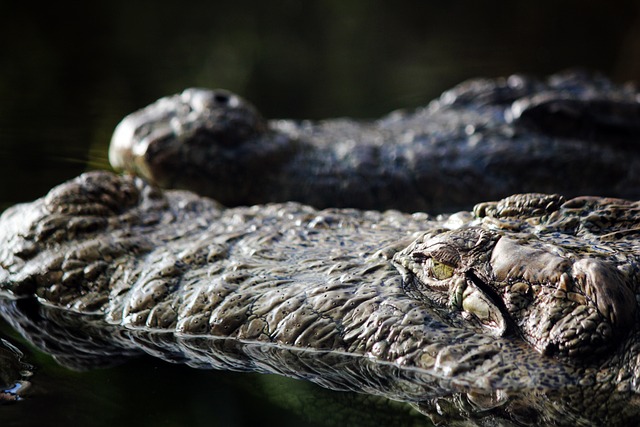
Is It Legal to Kill Alligators?
The legality of killing alligators depends on the state and specific circumstances involved. In certain states, such as Florida and Louisiana, alligators are protected by state law, and killing them is only permissible under certain circumstances, such as when they pose a danger to human safety or are part of a managed hunting program.
In other states, such as Texas, alligator hunting is regulated and allowed with a license during specific seasons.
It’s essential to review the legislation in your state before taking any action regarding alligators, as killing these creatures without legal authorization can result in substantial fines and legal repercussions.
Furthermore, it’s advisable to work with licensed professionals or animal officials when dealing with alligators to ensure that any eviction or relocation measures are executed humanely and safely.
What animals can kill an alligator?
Although alligators are powerful predators, they are not indestructible, and a few predators can kill them under specific circumstances. Large snakes, such as pythons and anacondas, can suffocate alligators.
Smaller alligators can be overwhelmed by Florida panthers and black bears. Large birds of prey, such as bald eagles and great-horned owls can attack young or small alligators.
Nevertheless, it’s important to keep in mind that alligators are apex predators and are not typically preyed upon in the wild. They possess strong jaws, muscular bodies, and durable skin, allowing them to defend themselves against potential threats.
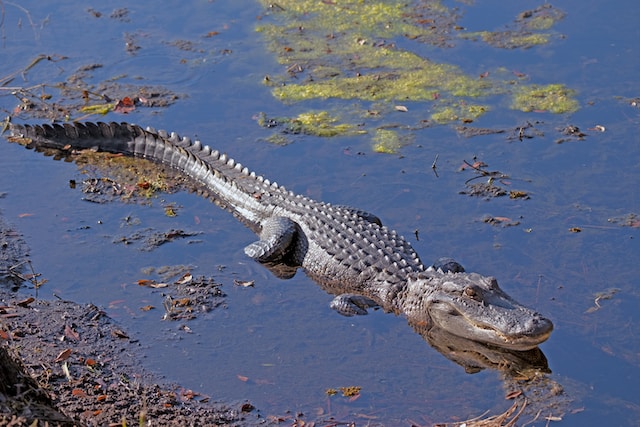
How Do You Stop an Alligator from Biting You?
If you are in danger of an alligator attack or if an alligator is attempting to bite you, it is essential to remain calm and composed.
Here are some tips on how to prevent an alligator from biting you:
- Get away if possible: Try to create distance between yourself and the alligator. Do this gradually and without turning your back on the animal.
- Counter-attack: If the alligator has ledged onto you and is holding on, you may need to fight back. Use any nearby objects to strike the alligator in its vulnerable areas, such as its eyes, snout, or throat.
- Break its grip: If the alligator has you in its teeths’ grip, try to separate its jaws by pushing down the bony plates on the sides of its jaw or striking it on the snout.
- Seek medical help: If an alligator has harmed you, seek medical assistance immediately. Alligator bites can result in serious infections and other health problems.
Remember, the best defense against being harmed by these animals is prevention. Avoid alligator habitats, follow warning signs and guidelines, and refrain from feeding or harassing alligators.
If you come across an alligator, give it plenty of space, and do not approach or provoke it in any way.
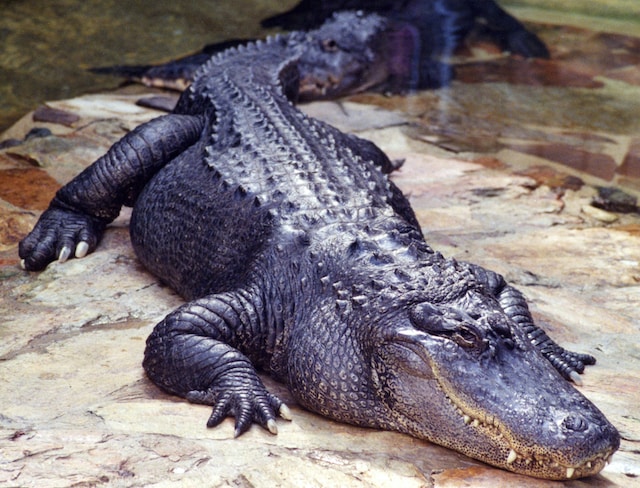
How to Keep Alligators Away From Your House?
To keep alligators away from your house, you must take preventative measures and adopt a proactive approach to discourage them from entering your grounds.
Here are some tips on how to keep alligators away from your house:
- Remove food sources: Alligators are attracted to food sources such as pet food, garbage, and compost piles. Maintain a clean environment on your property and dispose of any potential food sources.
- Secure your property: Erect fencing or walls around your property to deter alligators from entering. Repair any gaps or holes in the fence that might allow alligators to pass through.
- Secure your swimming pool. Putting up a pool cage or pool enclosure can be very effective.
- Clear brush and debris: Alligators often take shelter in dense vegetation and piles of rubbish. Clear your property of brush, leaves, and other debris that could serve as cover for alligators.
- Install motion-activated lights: Alligators are nocturnal and more likely to be active at night. Installing motion-activated lights around your property can help discourage alligators and other wild creatures from approaching.
- Refrain from feeding or harassing alligators: Feeding or harassing alligators can cause them to lose their natural fear of people and become more aggressive. Always keep a big distance and never provoke or approach alligators.
- Seek professional assistance: If alligators continue to be a problem on your property, consider contacting a licensed animal control service for assistance.
Remember that prevention is critical to keeping alligators away from your home. By removing potential food sources, securing your property, and avoiding interactions with alligators, you can help maintain a safe and alligator-free environment around your house.
Types of alligators
There are two types of alligators: the American alligator (Alligator mississippiensis) and the Chinese alligator (Alligator sinensis).
The American alligator is the more common of the two and can be found in the southeastern United States, including Florida, Louisiana, and Georgia.
They are large reptiles, with adults ranging from 8 to 14 feet (2.4 to 4.3 meters) in length and weighing up to 1,000 pounds (450 kilograms). American alligators have a wide snout and are usually grayish-black in color.
On the other hand, the Chinese alligator is smaller than the American alligator and is native only to China. They are among the rarest crocodilian species and are classified as critically endangered.
Chinese alligators typically measure around 5 feet (1.5 meters) in length and weigh approximately 100 pounds (45 kilograms). They have a slender snout and light brown coloring with dark stripes.
While both types of alligators share several characteristics in appearance and behavior, the Chinese alligator is significantly less common and well-known than the American alligator.





